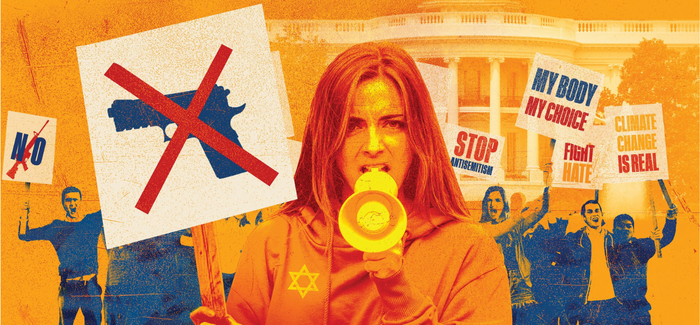Being Jewish
Commentary
A Civics Lesson for Jews

I visited the White House on July 11, 2022. Before you “ooh” and “aah” and say, “How exciting that must have been,” I will stop you to say: “It was no fun.”
I was there with hundreds of people who have been harmed by gun violence, as I was when a shooter entered the Tree of Life synagogue in Pittsburgh on October 27, 2018, and opened fire, killing 11. The grief in Washington was palpable. The man in line ahead of me and my husband, Rabbi Jonathan Perlman—who was leading services the day of the shooting for our New Light Congregation, which met inside Tree of Life—lost a son in a school shooting in Saguaro, Calif. Behind us stood a man from the Sandy Hook community in Newtown, Conn. There were families wearing T-shirts bearing images of their dead loved ones, others holding aloft photos of their deceased and sporting tattoos with the names and faces of those they’d lost.
The man next to us, Alexander Schultz, lost his father, Olympic wrestler Dave Schultz, when he was shot by a mentally unbalanced man who had power, wealth and access to guns. That shooting is now memorialized in the movie Foxcatcher.
We had congregated on the White House lawn to watch President Biden sign into law the Bipartisan Safer Communities Act. Among the speakers at the event were community members from Buffalo, N.Y., and Uvalde, Texas. Garnell Whitfield Jr. lost his 86-year-old mother, Ruth, when she was among the 10 Black people killed in the Tops supermarket in Buffalo in May 2022. Dr. Roy Guerraro, the only pediatrician in Uvalde, spoke of attempting in vain to reassure the traumatized children of his city. The astounding amount of loss that exists in this country because of gun violence was on full display.
And yet, there was an element of triumph, too. All of us were there because we had spoken out to promote change. Each attendee was present to witness the creation of a blueprint to limit weapons so that there might not be others who have to suffer as we have. This gun safety measure is an unparalleled victory for those who think public places—synagogues, churches and mosques, elementary schools and grocery stores—need to be spaces where citizens can gather without fear.
Gun violence is not the only issue on which Jews should think about speaking out. Our tradition offers clear guidance on how we, as Jews, should be involved in the society around us. The Talmud in Shabbat 54b states:
Anyone who had the capability to effectively protest the sinful conduct of the members of his household and did not protest, he himself is apprehended for the sins of the members of his household and punished. If he is in a position to protest the sinful conduct of the people of his town, and he fails to do so, he is apprehended for the sins of the people of his town. If he is in a position to protest the sinful conduct of the whole world, and he fails to do so, he is apprehended for the sins of the whole world.
This is a tall order, but the Jewish idea that we are required to speak out against a wrong, if we have the capacity to do so, is a worthwhile lesson.
One of the strongest ways to make our voices heard is to vote, which hopefully most of us did on November 8. If we want to live in a society shaped by our values, whether safety from gun violence, advocating for Israel, saving the environment for future generations or protecting women’s reproductive choices, it is incumbent upon us to speak publicly about those values.
Not all of us will need to make the journey to the White House lawn. Instead, let us be grateful at this season of Thanksgiving that wherever we are, we can express our Jewish values with our voices and our votes.
Beth Kissileff is co-editor of Bound in the Bond of Life: Pittsburgh Writers Reflect on the Tree of Life Tragedy and author of the novel Questioning Return.








 Facebook
Facebook Instagram
Instagram Twitter
Twitter
Leave a Reply